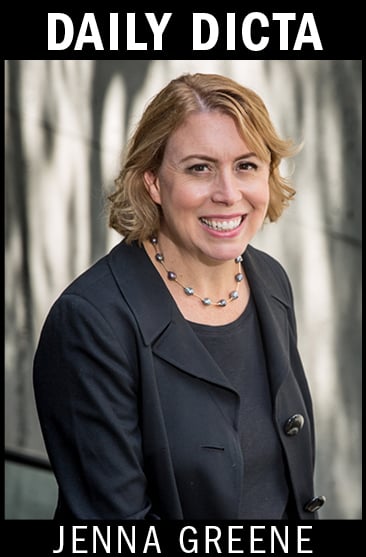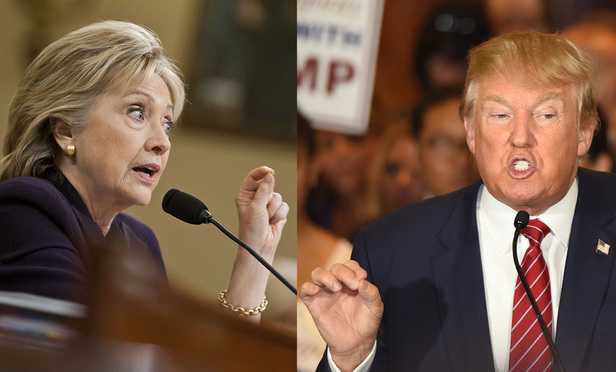As Americans head to the polls, a small army of election lawyers is waiting in the wings.
The odds of a contested election like Bush v. Gore—where the outcome is so close that it turns on one state, and one state is so close that victory hangs on a recount—are slim. But if it happens, there are lawyers on both sides ready to go, with Donald Trump’s team led by attorneys from Jones Day. Hillary Clinton has tapped counsel from Perkins Coie.
 If post-election litigation erupts, “We are ready to be called upon, but hopefully we won’t be,” said Stephen Zack, a Miami-based partner at Boies, Schiller & Flexner who along with name partner David Boies represented Al Gore in the 2000 recount. The firm has teamed up with Perkins Coie in key battleground states to represent Democrats in a series of voter suppression suits that could be seen as placeholders in the event an emergency election contest emerges.
If post-election litigation erupts, “We are ready to be called upon, but hopefully we won’t be,” said Stephen Zack, a Miami-based partner at Boies, Schiller & Flexner who along with name partner David Boies represented Al Gore in the 2000 recount. The firm has teamed up with Perkins Coie in key battleground states to represent Democrats in a series of voter suppression suits that could be seen as placeholders in the event an emergency election contest emerges.
Across the board, Clinton in 2016 has run a more organized, fully staffed campaign than Trump—“a machine” is how political observers often describe it. And she seems to have the edge in legal operations as well. According to the non-partisan Democracy in Action, she has five lawyers on staff in campaign headquarters and one staff lawyer on the ground in Florida. Democracy in Action lists one lawyer on the Trump campaign staff, general counsel Donald McGahn II, a Jones Day partner.
And though Trump has made headlines for alleging that the election is “rigged,” Clinton beat him to the punch with preemptive litigation.
Over the past 10 days, Clinton campaign general counsel Marc Elias, who chairs the political law practice at Perkins Coie, has co-filed federal suits with Boies Schiller and local counsel in six battleground states—Arizona, Michigan, Nevada, North Carolina, Ohio and Pennsylvania. The suits are on behalf of the state Democratic parties and allege that the state Republican parties, Donald Trump and Trump ally Roger Stone have engaged in illegal voter suppression and intimidation tactics.
Almost surely, it’s no coincidence that the lawsuits came exactly when Clinton nosedived in the polls. She held a solid 7-point lead in mid-October, but had dropped to about 2 percent by Halloween, according to RealClear Politics. Her lead now stands at about 3 percent—close enough that every vote is worth fighting over.
The suits—which are long on rhetoric but short on specific examples of actual voters who have been intimidated—have met with mixed success in court. For example, a federal judge in Arizona on Friday refused to issue an injunction ordering Republicans not to harass or intimidate voters, and the U.S. Court of Appeals for the Sixth Circuit on Sunday reversed a temporary restraining order issued by an Ohio judge against the Trump campaign.
But the litigation is about more than just getting a TRO. Think of it as setting the table.
“It’s prudent and strategic to anticipate problems,” said Stroock & Stroock & Lavan special counsel Jerry Goldfeder, an election law expert who serves on Clinton’s national finance committee.
For one thing, it sends a message to the Trump camp that they’re being watched.
It’s also been a way to force Republican organizations to disclose some of their materials, submitting, for example, the Arizona Republican Party poll watcher’s manual as an exhibit.
There’s a logistical element as well: if voter intimidation or other problems arise on Election Day, the Democrats already have complaints on the dockets, their lawyers have been admitted pro hac vice, local counsel is in place. It makes getting an emergency court order more feasible.
LEGAL LINE-UPS
The Dems have lined up local talent with deep election law experience and strong community ties—for example, Donald J. McTigue of McTigue & McGinnis in Ohio (“Referred to as the ‘Gold Standard’ in election law by a federal judge,” his law firm bio boasts).
In Nevada, there’s Don Springmeyer and Bradley Schrager of Wolf, Rifkin, Shapiro, Schulman & Rabkin, who both have long track records in local political fights; and in Pennsylvania, Mark Aronchick of Hangley, Arnonchick, Segal, Pudlin & Schiller. He was lead counsel with the ACLU in overturning the state’s ban on same-sex marriage.
At the helm nationally is GC Elias. Few lawyers can match his experience fighting over elections. His prior representations include serving as lead counsel for Senator Al Franken in the massive 2008 Minnesota Senate election recount; Virginia Attorney General Mark Herring in a 2013 recount; and Senator Harry Reid in connection with his 1998 recount.
McGahn, Trump’s campaign GC, is a Washington-based Jones Day partner who served as chairman of the Federal Election Commission in 2008. As the Washington Post pointed out, his uncle, Patrick McGahn, was also Trump’s go-to lawyer in Atlantic City for many years.
McGahn is viewed as a top election lawyer, but he’s better known for his campaign finance expertise than duking it out in a recount. However, his Jones Day colleague Benjamin Ginsburg was national counsel to the Bush-Cheney campaign and played a central role in the 2000 recount.
For local counsel, Trump’s picks are sometimes unexpected. In Pennsylvania, he tapped Marks & Sokolov, which is specializes in business disputes involving western and Russian companies. But in 1994, name partner Bruce Marks, as a Pennsylvania state senate candidate, won a federal court case when the judge ruled that his Democratic opponent stole the election through an elaborate fraud involving absentee ballots.
In Arizona and Nevada, Trump has turned to Kory Langhofer of Statecraft PLLC, a three-lawyer boutique in Phoenix that focuses on government and crisis management. Langhofer was general counsel for Carly Fiorina’s 2016 presidential campaign and litigation counsel for Gov. Mitt Romney’s 2012 presidential campaign.



